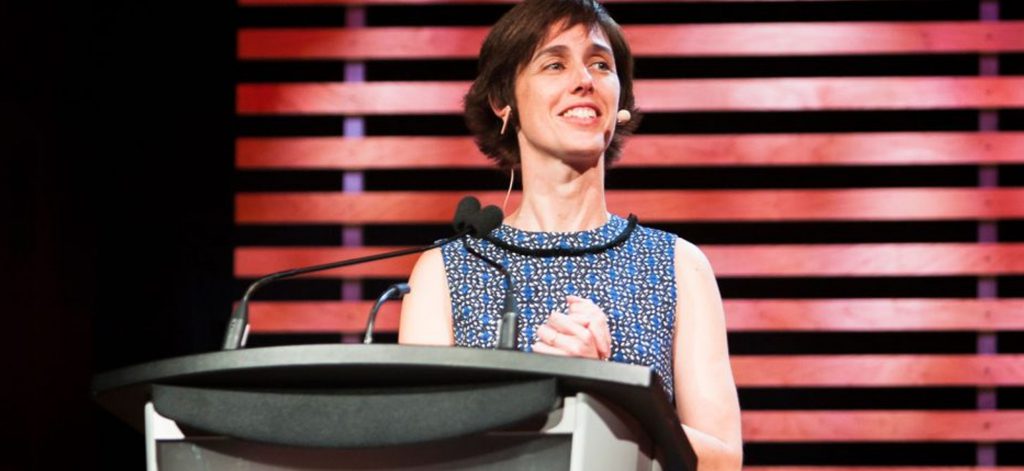By: Juanita Bawagan
30 Oct, 2017

Senior Fellow Joelle Pineau creates new algorithms every week and it seemed fitting that she shared a recipe of sorts for Canada’s AI Revolution at the CIFAR Massey Talk on Oct.23.
“There are a few ingredients in my mind to have a successful AI revolution,” said Pineau. She listed data, computing infrastructure, domain specific knowledge, efficient learning algorithms and architectures, and teams of talented scientists.
“All of the ingredients have to be aligned for us to make progress,” said Pineau who co-directs McGill University’s Reasoning and Learning Lab and heads the new Facebook AI Research lab in Montreal.
In the 1990s, Pineau was completing her PhD at Carnegie Mellon University in Pittsburgh. She recalled researchers were already developing self-driving cars then. One prototype was reputed to have driven from the east coast to the west coast, but mostly it “just followed the white line” on straight lengths of highway.
Though AI research goes back to the 1950s, major breakthroughs didn’t come until recently. This coincided with the shift from a “programmatic” approach to “show and tell.” Now, scientists don’t need to program pages of instructions but instead show the machine how to make decisions and let the machine learn to come to its own conclusions. This process, known as deep learning, would not have been possible without massive datasets and the computing power to process them.
Deep learning has driven huge advancements in computer vision and speech recognition — and had important implications for everything from autonomous driving to bots like Alexa.
“We’re calling it a revolution because the impact of the new artificial cognitive technology is really showing up in many different sectors of our economies and our societies,” Pineau said.
This is where the “domain specific knowledge” comes is.
“We’re calling it a revolution because the impact of the new artificial cognitive technology is really showing up in many different sectors of our economies and our societies”
Pineau is particularly interested in AI applications for healthcare. Currently, her lab is working with top neuroscientists to explore ways to better treat epilepsy. Epileptic seizures occur when brain signals synchronize and cause hyperstimulation. One therapy uses electrical stimulation in real time to disrupt the signals that cause seizures. Using reinforcement learning, the researchers are trying to disrupt these brain signals with the weakest and fewest electrical pulses. They are currently studying this in animal models, but this AI-driven approach could prove useful for a number of complex human diseases including cancer, diabetes and sleep disorders.
“Here in Canada we’ve been really lucky to be at the forefront of this revolution.”
Last but not least, the most important ingredient for a successful AI revolution are the researchers.
“Here in Canada we’ve been really lucky to be at the forefront of this revolution. We’ve been sitting in the front seat watching it happen because we had some of the leading researchers… Geoff Hinton, Yann LeCun, Yoshua Bengio and of course the great population of grad students who they’ve trained over the years,” Pineau said.
Pineau is hopeful that the next generation of researchers will keep the AI revolution moving forward from industry and university labs. However, one of the biggest challenges is training enough researchers to keep up with demand across all fields.
This challenge emerged again in Pineau’s discussion with Junior Massey Fellows. She identified the shortage of researchers as the biggest “bottleneck” in the AI research community. They not only need more researchers, but a more diverse representation of people.
“As a woman in tech, this has been a familiar theme throughout my career. There’s really a sense that as researchers a lot of our job is picking the right questions to ask. And when we pick the question, we’re directing the research agenda,” Pineau said.
“And if we have a narrow segment of our population asking all the questions then building the technology, then we’re going to possibly have a very narrow set of technology.”